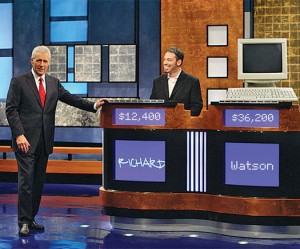 “No, it’s too hard. Forget it, no way you can do it.”
“No, it’s too hard. Forget it, no way you can do it.”
This was the reaction to IBM researcher David Ferrucci’s proposal to attempt to build a machine intelligent enough to play and win on the TV game show, Jeopardy. Speech is difficult for computers because our language is full of “intended meaning,” with every sentence jammed full of idioms, nuanced allusions, and content-specific meaning. Add in the context we convey with voice and tone changes, rising and falling inflections, body language, and you begin to understand the complexities of human—computer conversation.
However, an artificial intelligence capable of carrying on human conversation has multiple commercial applications. Anything that can substitute for people promises big labor savings. A Jeopardy-capable computer would be a major step toward that profitable goal. Ferrucci believed that he could do what others deemed impossible. Thus he argued passionately for his project and in spite of the skeptics he was able to win the go-ahead he wanted.
This fall, three years later, the supercomputer “Watson,” will debut on nationwide television. Preliminary tests with former Jeopardy contestants reveal that Watson will be a formidable contender, using algorithms to make astoundingly accurate associations that mirror human intuitive leaps. (The New York Times Magazine, June 20, 2010.)
The point? I can’t tell you how often I am told, “It’s impossible.” No, it’s not. It just hasn’t been done yet. It may be demanding, it may be challenging, it may take awhile. It may even be improbable, likely not worth the effort. Perhaps impossible on the first attempt. But flat out impossible? No way!
How can we know? Let’s give it a try. That is the definition of entrepreneurship: The willingness to try.
I’ve failed repeatedly. Many times I’ve not achieved my objective. BUT, you’d be amazed how many times the door opens when you knock, especially when you approach with confidence and knock with intensity.
Closing Quotes:
“Those who say it can’t be done are usually interrupted by others doing it.” – James Baldwin
“I have learned to use the word impossible with the greatest caution.” – Wernher von Braun
“Every noble work is at first impossible.” – Thomas Carlyle
“Most of the important things in the world have been accomplished by people who have kept on trying when there seemed to be no hope at all.” – Dale Carnegie
“The only way of finding the limits of the possible is by going beyond them into the impossible.” – Arthur C. Clarke


0 Comments